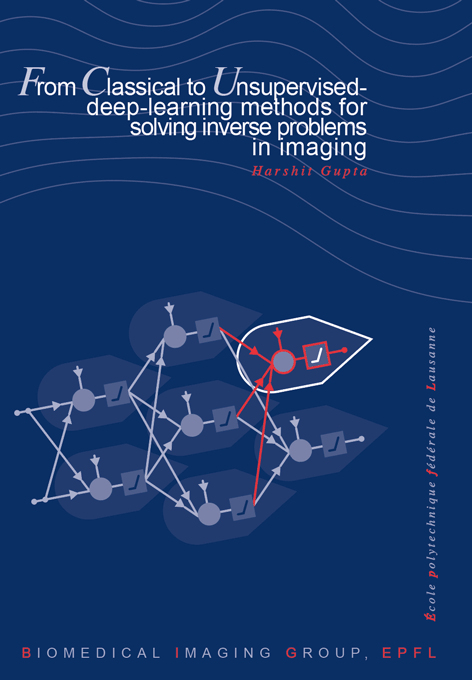From Classical to Unsupervised-Deep-Learning Methods for Solving Inverse Problems in Imaging
H. Gupta
École polytechnique fédérale de Lausanne, EPFL Thesis no. 7360 (2020), 248 p., September 29, 2020.
In this thesis, we propose new algorithms to solve inverse problems in the context of biomedical images. Due to ill-posedness, solving these problems require some prior knowledge of the statistics of the underlying images. The traditional algorithms, in the field, assume prior knowledge related to smoothness or sparsity of these images. Recently, they have been outperformed by the second generation algorithms which harness the power of neural networks to learn required statistics from training data. Even more recently, last generation deep-learning-based methods have emerged which require neither training nor training data.
This thesis devises algorithms which progress through these generations. It extends these generations to novel formulations and applications while bringing more robustness. In parallel, it also progresses in terms of complexity, from proposing algorithms for problems with 1D data and an exact known forward model to the ones with 4D data and an unknown parametric forward model.
We introduce five main contributions. The last three of them propose deep-learning-based latest-generation algorithms that require no prior training.
1) We develop algorithms to solve the continuous-domain formulation of inverse problems with both classical Tikhonov and total-variation regularizations. We formalize the problems, characterize the solution set, and devise numerical approaches to find the solutions.
2) We propose an algorithm that improves upon end-to-end neural-network-based second generation algorithms. In our method, a neural network is first trained as a projector on a training set, and is then plugged in as a projector inside the projected gradient descent (PGD). Since the problem is nonconvex, we relax the PGD to ensure convergence to a local minimum under some constraints. This method outperforms all the previous generation algorithms for Computed Tomography (CT).
3) We develop a novel time-dependent deep-image-prior algorithm for modalities that involve a temporal sequence of images. We parameterize them as the output of an untrained neural network fed with a sequence of latent variables. To impose temporal directionality, the latent variables are assumed to lie on a 1D manifold. The network is then tuned to minimize the data fidelity. We obtain state-of-the-art results in dynamic magnetic resonance imaging (MRI) and even recover intra-frame images.
4) We propose a novel reconstruction paradigm for cryo-electron-microscopy (CryoEM) called CryoGAN. Motivated by generative adversarial networks (GANs), we reconstruct a biomolecule's 3D structure such that its CryoEM measurements resemble the acquired data in a distributional sense. The algorithm is pose-or-likelihood-estimation-free, needs no ab initio, and is proven to have a theoretical guarantee of recovery of the true structure.
5) We extend CryoGAN to reconstruct continuously varying conformations of a structure from heterogeneous data. We parameterize the conformations as the output of a neural network fed with latent variables on a low-dimensional manifold. The method is shown to recover continuous protein conformations and their energy landscape.

@PHDTHESIS(http://bigwww.epfl.ch/publications/gupta2002.html,
AUTHOR="Gupta, H.",
TITLE="From Classical to Unsupervised-Deep-Learning Methods for Solving
Inverse Problems in Imaging",
SCHOOL="{\'{E}}cole polytechnique f{\'{e}}d{\'{e}}rale de {L}ausanne
({EPFL})",
YEAR="2020",
type="{EPFL} Thesis no.\ 7360 (2020), 248 p.",
address="",
month="September 29,",
note="")